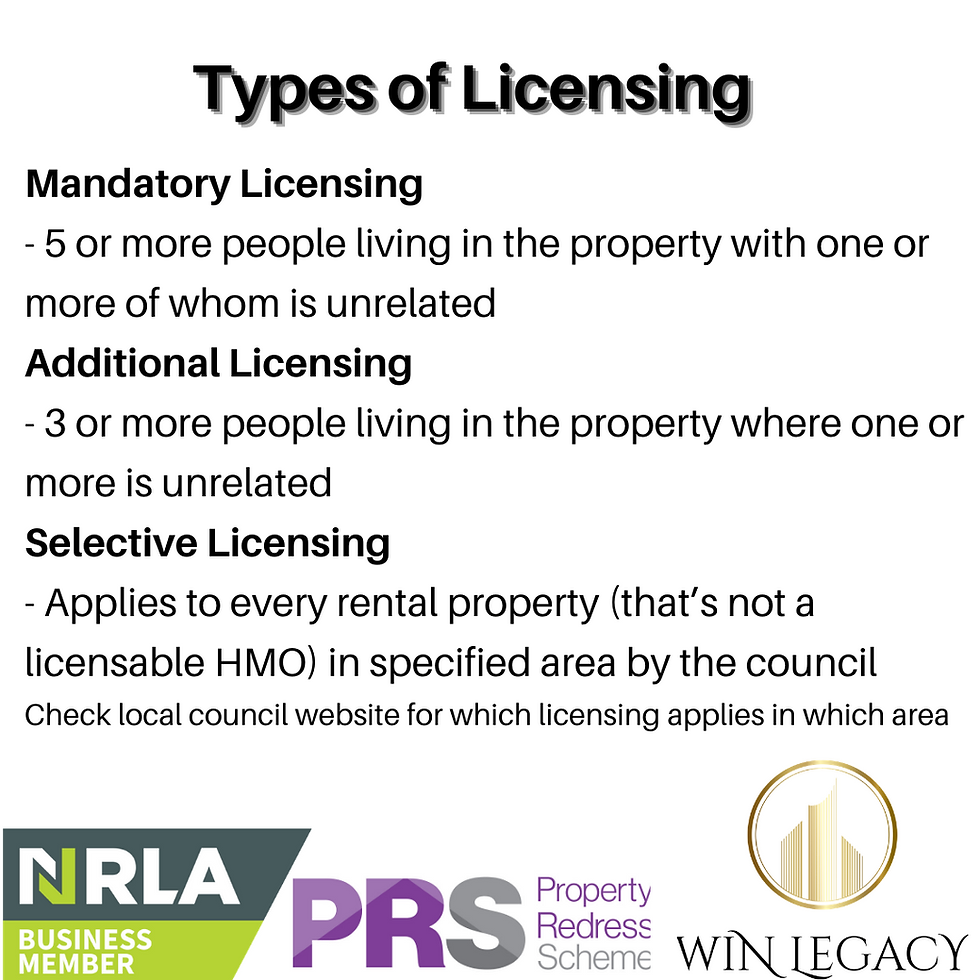
Letting and property investment can be complicated at times. Especially when the government continuously introduces and changes the laws. From their point of view this is to prevent rogue landlords from operating their properties in bad practice. The first step is to determine if your home is a House in Multiple Occupation (HMO) (HMO). While you might read the law itself (Sections 254–260 Housing Act 2004), you would prefer the Gov.uk website's much clearer guidance.
Step 1: Is your property an HMO?
An HMO is described as any property (house of flat) occupied by three or more people who share facilities (kitchen, bathroom, and/or toilet) and occupy the property as their only or primary residence, even if they are all friends and occupy the property on a single tenancy.
If all of the inhabitants are members of the same family, they are deemed to be in the same household (Section 258 Housing Act 2004). This includes people living together as husband and wife or in a same-sex relationship, as well as family members such as parents, grandparents, children, grandchildren, brothers, sisters, uncles, aunts, nephews, nieces, and cousins. A half-blood relationship receives the same treatment as a full-blood relationship, and a stepchild receives the same treatment as a child.
The Regulations also specify how live-in staff, carers, migrant or seasonal workers should be counted. If this scenario applies to you, there is a lot of information to study.
Step 2: Does the mandatory HMO licensing scheme apply to your property?

So you have established that your property is an HMO but are unsure whether it needs a licence. It is important to know there are three types of licensing that operate in England:
Mandatory HMO licensing
Additional licensing
Selective licensing
Though mandatory HMO licensing is in place throughout England, additional and selective licensing schemes are only in operation in specific areas. You would need to contact your local council if you live anywhere else in the country.
HMO licensing is not mandatory for all HMOs. Part II of the Housing Act 2004 restricts it to some larger properties – an estimated 220,000+ properties.
If your property meets the standard test, self-contained flat test, or converted building test HMO specification (section 254 of the Housing Act 2004) and is occupied by five or more people, you'll need a mandatory HMO license.
But what exactly are these tests, and what do they imply in practice? It means that any house or flat occupied by five or more individuals who are not related and live in the property as their primary residence requires a license.
For example, it includes:
Shared houses and flats occupied by students and young professionals;
Properties converted into bedsits with some shared facilities; and
Properties converted into a mixture of self-contained and non self-contained accommodation.
The mandatory HMO licensing scheme originally applied to properties of three or more storeys prior to October 1, 2018, but that limit has now been lifted.
There is a significant exception to be aware of when determining whether or not your property requires a license. The government has decided to exclude purpose-built self-contained flats from the mandatory HMO licensing scheme if they are part of a block of three or more self-contained flats.
While this exemption will be beneficial to certain landlords, it will complicate the licensing process. If your council has implemented an extra or limited licensing system, these purpose-built flats may still be licensable.
Step 3: Apply for a mandatory HMO licence
If you discover that your property requires licensing, you must apply for a license through your local council's prescribed procedure. A floorplan of the house, as well as various supporting documents, are normally requested by councils. There will be an application fee to pay, and the license will be valid for up to five years.
There is no waiting period, so the application must be submitted on or before the tenants' move-in date.
If you discover you are already running a licensable but unlicensed house, you must apply as soon as possible to avoid putting yourself in jeopardy.
If you choose to reduce the occupancy level below the licensing threshold, return to a single family let, or secure vacant possession so you can sell the land, you can apply for a temporary exemption from licensing.
If you break the rule, you may face serious consequences. You run the risk of being charged by the council, and if convicted, you could face a criminal record, an unlimited fine, and court expenses and a victim surcharge.
Alternatively, the council could impose a civil penalty of up to £30,000 and you may be subject to a Rent Repayment Order, requiring you to repay up to a year's worth of rental income.
Until the application is submitted, you cannot use a Notice of Seeking Possession under Section 21 Housing Act 1988 to evict your tenants. As such, it is far better to comply at the earliest opportunity.
HMO license exemptions
Certain types of properties are not classed as HMOs for the purpose of the Housing Act 2004 (other than for the Housing Health and Safety Rating System) and, as a result, are not subject to licensing.

A full list of the exemptions is detailed in Schedule 14 of the Housing Act 2004 (as amended)
The exemptions include:
Two persons – any building occupied by only two persons in two households
A property where the landlord and their household lives with up to two lodgers
Buildings occupied entirely by freeholders or long leaseholders (or 2/3rd occupied in the case of a section 257 HMO)
Buildings owned or managed by a public body (such as the NHS or police), a local housing authority or a registered social landlord
A building where the residential accommodation is ancillary to the main use of the building, for example, religious buildings, conference centres etc.
Student accommodation managed directly by an educational establishment
Buildings which are already regulated (and where the description of the building is specified in regulations), such as care homes, bail hostels etc. Domestic refuges are not exempt.
Certain buildings that are controlled or managed by a co-operative
There you have it all on the topic of HMO licensing. If you are unsure still and want to ask more questions, or if you have any other enquiries regarding letting and property investments, we are here to help. Click here.


Comments